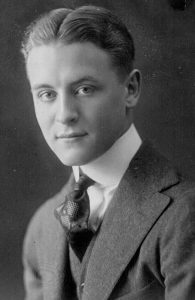The Curious Case of Benjamin Button
WRITTEN BY:
F. Scott Fitzgerald
NARRATED BY:
Michael Scott
“The Curious Case of Benjamin Button” is a short story written by F. Scott Fitzgerald and published in 1922. The story is about a man named Benjamin Button who is born with the physical appearance and characteristics of an old man, but as he ages, he grows younger instead of older. As a child, he is rejected by his own father who believes he is a monster. As a young man, he falls in love with a young woman named Hildegarde, but their relationship becomes complicated as Benjamin grows younger and their ages begin to diverge. Eventually, Benjamin becomes a baby and is taken care of by his own son, who is now an old man.
The story is significant for its exploration of themes related to aging, mortality, and the passage of time. It is also an allegory for the human experience, as Benjamin’s unusual life journey reflects the inevitability of change and the impermanence of life. Fitzgerald’s use of magical realism in the story, in which a fantastical element is introduced into a realistic setting, serves to underscore the surreal and unsettling nature of Benjamin’s condition and to highlight the existential questions that arise as a result. Overall, “The Curious Case of Benjamin Button” is a powerful meditation on the human condition and a poignant commentary on the transience of life.
__________
ThoughtAudio PDF Transcript: 0TA0006_BenjaminButton_FScottFitzgerald.pdf
__________
 F. Scott Fitzgerald
F. Scott Fitzgerald
Scott Fitzgerald is considered one of the most important and influential American writers of the 20th century. His literary significance lies in his ability to capture the spirit of the Jazz Age, a period of post-World War I prosperity and excess, in his novels and stories. His writing explores themes of wealth, class, love, and loss, and his characters are often flawed and complex, struggling to find their place in a rapidly changing world.
Fitzgerald’s prose style is characterized by its lyricism, elegance, and vividness. His writing is known for its use of symbolism, metaphor, and imagery, which are often used to convey deeper meanings and to illuminate the psychological and emotional lives of his characters.
Some of Fitzgerald’s most famous works include “The Great Gatsby,” a novel that has become a cultural touchstone and is considered one of the greatest American novels of all time, and “Tender Is the Night,” a novel that explores the breakdown of a marriage and the disintegration of the American dream.
Fitzgerald’s writing continues to resonate with readers today, as it offers a powerful commentary on the human condition and the complexities of modern life. His legacy as a writer remains strong, and his work continues to be studied, analyzed, and celebrated by scholars, critics, and readers alike.
